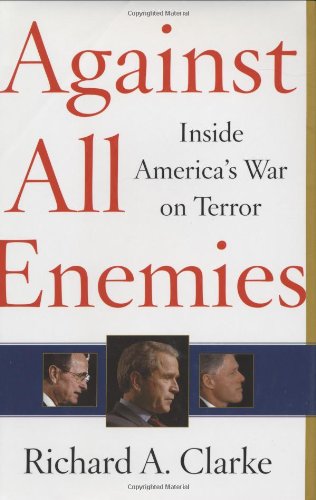- Date: 02.11.2008
- Book: Against All Enemies: Inside America's War on Terror
- Author: plappen
Review
Against all Enemies: Inside America's War on Terror, Richard A. Clarke, 2004, ISBN 0743260244Richard Clarke has worked in the area of national security for the past 30 years. He was head of counterterrorism affairs for Presidents Clinton and Bush II. In this book, he severely criticizes the current Bush Administration for its lack of interest in terrorism and al Qaeda before 9/11, and its disastrous decisions afterwards.
He first explores the Reagan and Bush I reactions to events like Lockerbie, TWA 800, and the Beirut bombing that killed over 200 American soldiers. The word "terrorism" had not yet entered the American lexicon. Whatever else is said about the Clinton Administration, at least President Clinton took the threat from al Qaeda very seriously, and tried to do something about it.
There were several opportunities to get Osama bin Laden during the Clinton years. Unfortunately, the reports that he was in a certain building at a certain time were never rock solid. Even if they were totally reliable, it takes time to get the report from Afghanistan to Washington, and for the appropriate orders to be sent to the ships or planes in the area. No senior al Qaeda figure, especially bin Laden, was going to stay in one place for any length of time. If the US had bombed innocent people, it would have been a public relations disaster.
The second Bush Administration came into office much more concerned about Iraqi terrorism than about al Qaeda (according to Clarke, for no good reason). When he tried to impress upon senior White House officials the seriousness of the threat from al Qaeda, he was met with bureaucratic delay after delay. Bush's decision to invade Iraq (again, according to Clarke, for no good reason) gave al Qaeda a propaganda coup of immense proportions.
After 9/11, the Bush Administration should have worked to improve relations with the frontline states, like Iran and Saudi Arabia, that are most vulnerable to al Qaeda. It should also have worked to improve relations with Islam, in general. These things were not done. Officially, there was no federal money available to fix the gaping holes in America's domestic vulnerability to terrorist attack, but there was plenty of money to invade Iraq.
Could 9/11 have been prevented, even if all parts of the intelligence community were running like a well-oiled machine (another area of criticism from Clarke)? Perhaps not. If a major attack didn't happen on that particular day, it would have happened some other day. This book is a huge wake-up call, and it is very highly recommended for all Americans. If I could, I would give this book three thumbs up.
Recent actions
-
toryah1988 has added Harry Potter And The Order Of The Phoenix to their read list.
-
toryah1988 has added Harry Potter And The Goblet Of Fire to their read list.
-
toryah1988 has added Atonement to their read list.
-
toryah1988 has added New Moon (The Twilight Saga) to their read list.
-
Monica has added The Da Vinci Code (Large Print) to their wish list.
